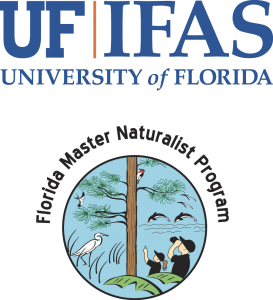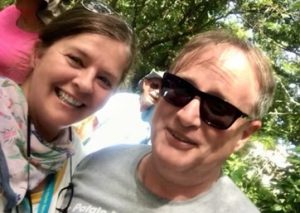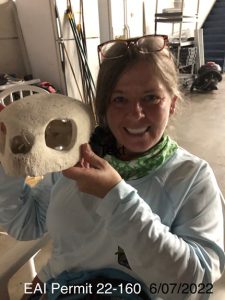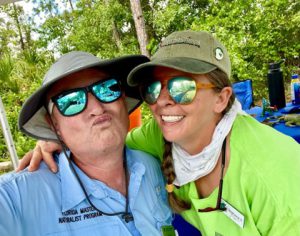
The mission of the Florida Master Naturalist Program (FMNP) is to promote awareness, understanding, and respect of Florida’s natural world among Florida’s citizens and visitors. We’re highlighting graduates of the Florida Master Naturalist Program (FMNP) as part of a series. This blog features my interview with Florida Master Naturalist Stephanie Santiago. You can reach me for additional information at ktgioeli@ufl.edu. Learn more about FMNP, check out the program website HERE.

Ken: Hi Stephanie. I always enjoyed having you as a student, but I know I was not your only Master Naturalist instructor. When and where did you take your FL Master Naturalist courses? Which courses did you take?
Stephanie: I took my first Florida Master Naturalist Coastal Systems course in 2017 in Port St Lucie. So far, I have taken two core courses: Coastal Systems and Upland Systems. I have also taken three Land Steward courses: Environmental Interpretation, Conservation Science, and Habitat Evaluation. Additionally, I have registered for my first Restoration course in October, which is being held in Leon County but is offered 100% online. The Restoration course I am taking is on Invasive Plants.
Ken: I know you love Florida’s sea turtles and appreciate the need to conserve them. Why is sea turtle conservation important to you?
Stephanie: To me, sea turtle conservation is deeply important because these magnificent creatures play an essential role in maintaining the health of our oceans, which is vital for our planet’s overall ecosystem balance. Their struggle for survival also mirrors the challenges we face with environmental issues like climate change and pollution, reminding us of the urgency and responsibility we have in preserving all forms of life.
Ken: You recently graduated from the Florida Master Naturalist Habitat Evaluation course conducted in summer 2023. We showed students about the processes used to evaluate sea turtle nesting habitat on Florida’s beaches. Is there a “take home” message you would like people to know?
Stephanie: Upon completing the Habitat Evaluation course, I’ve learned that the intricate balance of our ecosystems heavily relies on each element within it, including sea turtle nesting habitats. The key takeaway I’d like to share is the crucial role that responsible coastal development and management play in preserving these habitats and, consequently, protecting sea turtle populations. Our collective actions matter, and we must strive to live harmoniously with nature, safeguarding it for future generations.

Ken: For our Habitat Evaluation course, you created a bioblitz for Spruce Bluff Preserve in Port St Lucie. Why do you encourage others to visit this preserve and participate in the bioblitz? https://www.inaturalist.org/projects/spruce-bluff-preserve-bioblitz
Stephanie: I strongly encourage others to visit Spruce Bluff Preserve and participate in the bioblitz using the iNaturalist app. It’s a remarkable opportunity to connect with nature while contributing to the scientific understanding of our local biodiversity. Spruce Bluff Preserve is teeming with diverse species and historical significance. By using iNaturalist during the bioblitz, you get a unique, interactive way to identify and learn about different species. Plus, the observations you make help create a valuable database for scientists studying changes in species distribution and ecosystem health.
Ken: How has participation in the Florida Master Naturalist Program help you?
Stephanie: Participation in the Florida Master Naturalist Program has significantly enriched my understanding of Florida’s unique ecosystems, and the diverse species that inhabit them. This experience has allowed me to develop practical skills in habitat evaluation and species identification, which I can apply in numerous contexts. More importantly, the program has nurtured in me a deeper connection with nature and an amplified sense of responsibility towards conservation. It’s motivated me to engage more actively in environmental initiatives and to encourage others to appreciate and protect our natural world.
Ken: Can you describe one or two of the most memorable things you’ve done through the Florida Master Naturalist Program?
Stephanie: In 2018, during my Upland Systems course, I had the opportunity to visit two remarkable locations: Archbold Biological Station in Venus, and Adams Ranch in Fort Pierce. At Archbold, I delved into the intricacies of the Florida scrub ecosystem and had a meaningful encounter with a threatened Florida scrub-jay. At Adams Ranch, I witnessed first-hand the impact of dedicated land preservation efforts in a place teeming with diverse wildlife. Both of these experiences emphasized the importance of conservation and continue to inspire my commitment to ecosystem protection.
Ken: Where in Florida is your favorite place to go hiking that is also publicly accessible? Why is it your favorite place?
Stephanie: One of my favorite places to go hiking in Florida, which is also publicly accessible, is Jonathan Dickinson State Park in Hobe Sound. As the largest state park in Southeast Florida, it features a myriad of distinct natural communities ranging from coastal sand hills and upland lakes, to scrub forests and the pristine Loxahatchee River. Beyond hiking, I also enjoy kayaking and biking there, which allows me to appreciate the park’s diverse landscapes from different perspectives. Its rich biodiversity and variety of activities make every visit unique, making it my favorite destination for both adventure and tranquility.
Ken: After participating in the Florida Master Naturalist Program, can you estimate how many people you’ve been able to teach about conservation?
Stephanie: Utilizing both social media and in-person interactions, I’ve shared my knowledge about conservation with a wide audience. On social media, my posts on environmental issues reach a broad spectrum of individuals, potentially in the hundreds. During personal outings such as hikes with friends, I have the opportunity to highlight local biodiversity and discuss pressing environmental issues. Although hard to quantify, I believe these combined efforts have had a substantial impact in promoting conservation awareness.

Ken: Do you think you’ve made an impact as a Florida Master Naturalist?
Stephanie: Indeed, as a Florida Master Naturalist, I’ve been able to utilize the knowledge and skills I gained from the program to effect change in my own circles and beyond. I’ve facilitated a deeper understanding of our environment and the need for conservation amongst friends, followers on social media, and those I’ve interacted with in the field. These subtle shifts in perception and awareness can add up to significant change, reinforcing that every effort, no matter how small it may seem, can make a difference in the grand scheme of conservation.
Ken: Is there anything else you would like to add?
Stephanie: Being part of the Florida Master Naturalist Program has been a truly enriching experience. It’s given me tools and knowledge to make a difference in my local environment and has inspired me to keep learning and advocating for our natural world. To anyone with an interest in conservation, I highly recommend seeking out educational opportunities like this – it’s a rewarding journey that not only benefits you personally but also contributes to the broader goal of preserving our planet.
Resources:
Florida Master Naturalist Program. https://masternaturalist.ifas.ufl.edu/
Spruce Bluff Preserve. https://www.stlucieco.gov/departments-and-services/environmental-resources/county-preserves/spruce-bluff-preserve
Spruce Bluff Preserve Bioblitz. https://www.inaturalist.org/projects/spruce-bluff-preserve-bioblitz
UF/IFAS Extension St Lucie County. https://sfyl.ifas.ufl.edu/stlucie/
_________________________
The mission of the University of Florida Institute of Food and Agricultural Sciences (UF/IFAS) is to develop knowledge relevant to agricultural, human and natural resources and to make that knowledge available to sustain and enhance the quality of human life. With offices in each of Florida’s 67 counties, UF/IFAS Extension works to bring science-based solutions to the state’s agricultural and natural resources industries, and all Florida residents.
SolutionsForYourLife.com | @UF_IFAS An Equal Opportunity Institution
 1
1
